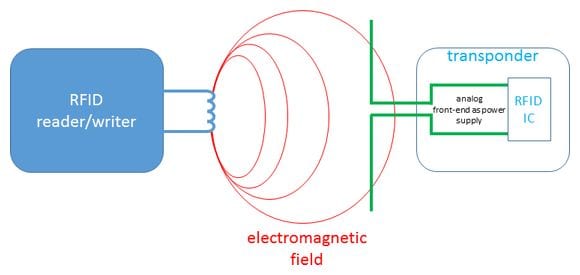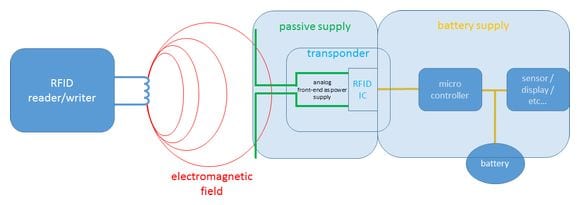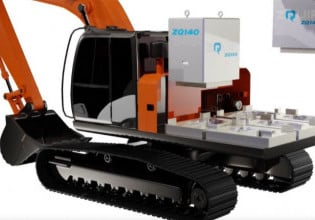Reference Design Board for Battery-Less ePaper Tags
E Ink Holdings and Fujitsu Semiconductor Limited today announced the joint development of a reference design board (Product number: MB97R8110) for battery-less ePaper tags. The solution adopts E Ink's low voltage ePaper module and Fujitsu Semiconductor Limited's UHF FRAM RFID LSI, creating an ideal combination to enable battery-less ePaper tag applications.
This novel application was a collaborative effort between the ecosystem partners, including E Ink, Fujitsu Semiconductor, and Toppan Printing. The reference design board enables data transfer distances of up to 20cm, enabling the tag to be updated at any time without data storage restrictions.
Since the new UHF RFID product MB97R8110 has an SPI master port embedded, it is not necessary to use an MCU but instead the MB97R8110 can be used as bridge between the RFID reader/writer device and the connected peripheral component.
Also, the MB97R8110 has the ability to output a power supply to connected devices to avoid using a battery to enable battery-less systems. With this solution, cost-efficient UHF based RFID can be realized without having to use a battery including wireless sensors, keyboards, remote controls, and LED controls in addition to E-ink displays.
Product features:
- Compliant with EPCglobal Class 1 Generation 2
- Carrier frequency: 860 MHz - 928 MHz
- Data rate:
- 7 kbps - 128kbps (RW->Tag)
- 40 kbps - 640 kbps
- External Power supply by RF (3.0V, 600µA @ +6dBm)
- SPI interface
- SPI slave interface to access memory
- SPI master interface to control SPI peripheral device
- High speed read/write non-volatile memory (FRAM)
- USR bank size: 61.440 bits
- EPC bank size: up to 480bits
- Block Permalock (write protection in unites of 512 words)
- Read/Write Endurance: 1013 times
- Memory data retention: 10 years (+85°C)
- Key-Scan circuit
"E Ink is continuously working to improve and develop new power saving ePaper solutions," said Johnson Lee, President of E Ink Holdings Inc. "Combining two major trends in the electronics industry, battery-less and energy harvesting, this unique logistics ePaper tag will be a game changer in the logistics management industry.
"Japanese convenience store chains have already noticed the environmentally friendly value the ePaper tag brings, and are expected to deploy ePaper logistics tag solutions to replace paper tags in Japan," observed Lee.
Energy Harvesting
RFID is a passive technology that usually harvests energy from the electromagnetic field generated by the reader/writer device and uses this energy for the internal electric circuit. An analog front-end in the RFID IC converts the electromagnetic field into a voltage that is sufficient to supply energy for the memory access and to provide an answer back to the RFID reader/writer device.
If additional components need to be connected to the RFID system, there is the possibility to use a dual-interface product and access the FRAM memory through a serial SPI interface. Usually this access is performed by a microcontroller which has to be supplied with power from e.g. a battery. Same with other components that might be connected to the microcontroller like a sensor or a display.
Considering the fact that in the above example the microcontroller is only used to communicate with the single components, it can be replaced if another SPI master device is used. Since the new UHF RFID product MB97R8110 has an SPI master port embedded, it is not necessary to use an MCU but instead the MB97R8110 can be used as bridge between the RFID reader/writer device and the connected peripheral component.
Also, the MB97R8110 has the ability to output a power supply to connected devices to avoid using a battery to enable battery-less systems. With this solution, cost-efficient UHF based RFID can be realized without having to use a battery.
"The technology collaboration by E Ink and Fujitsu Semiconductor Limited resulting in a battery-less ePaper solution," said Masato Matsumiya, VP Head of System Memory Company of Fujitsu Semiconductor Limited.
"The reference design board enables maintenance free performance and the inclusion of FRAM allows for low power consumption, fast writing speeds and a non-volatile system. This enables the tag to be updated at any time without data storage restrictions. This technology will generate innovative applications in new markets," added Matsumiya.
"The combination of E Ink technology and the UHF band, widely used in the logistics industry, is a world's first and has promising potential," said Shinji Ooi, General Manager of Business Development Center of Toppan Printing Co., Ltd. "We are working towards early commercialization of this combination." Toppan is developing and will produce battery-less tags initially for Japanese convenience store chains and then for the general logistics and manufacturing sectors.
The battery-less ePaper tag solution will be targeted in applications such as logistics tags, ePaper badges, ID cards or electronic shelf labels. The reference design board will be exhibited at Toppan Printing's booth (West Hall No.4 D-05) and Denso Wave's booth (West Hall No.4 G-20) in the "AutoID & Communication Expo" at Tokyo Big Sight from September 12 to September 14.










